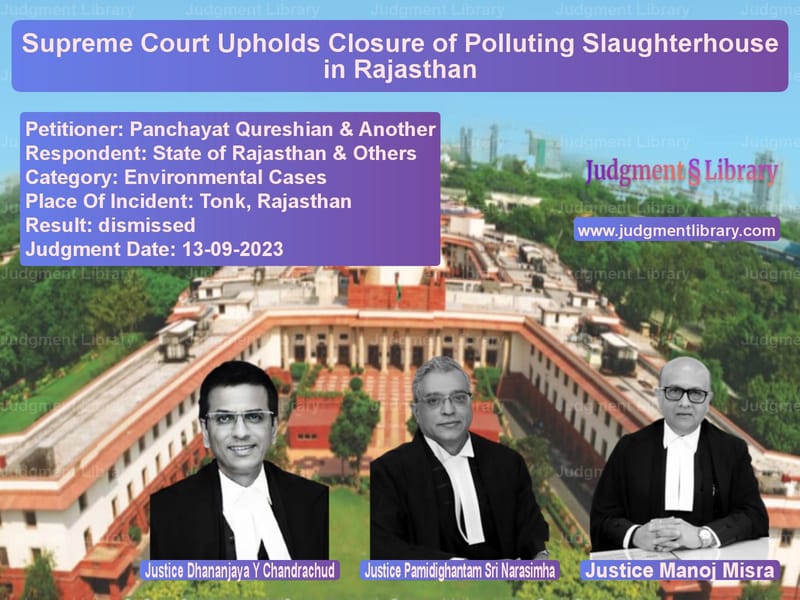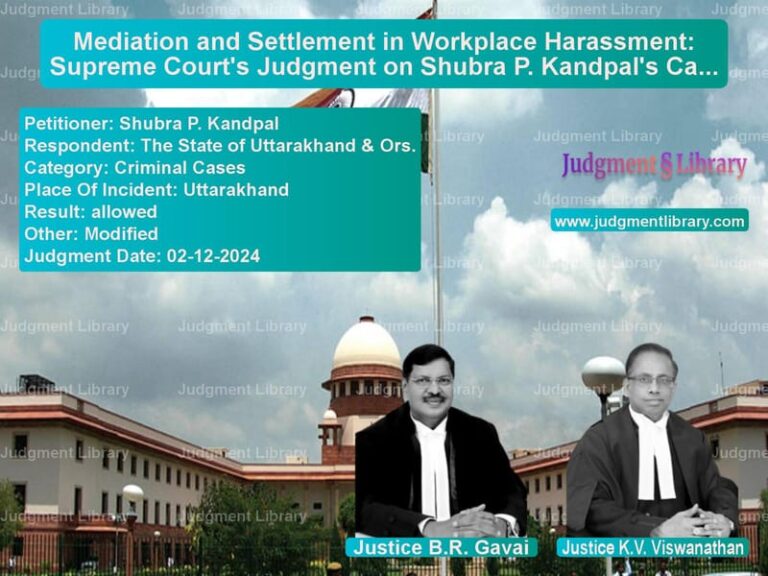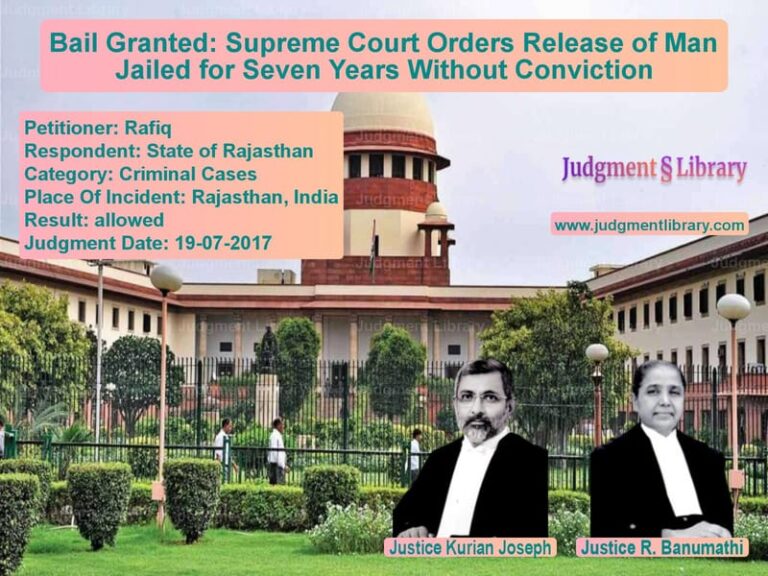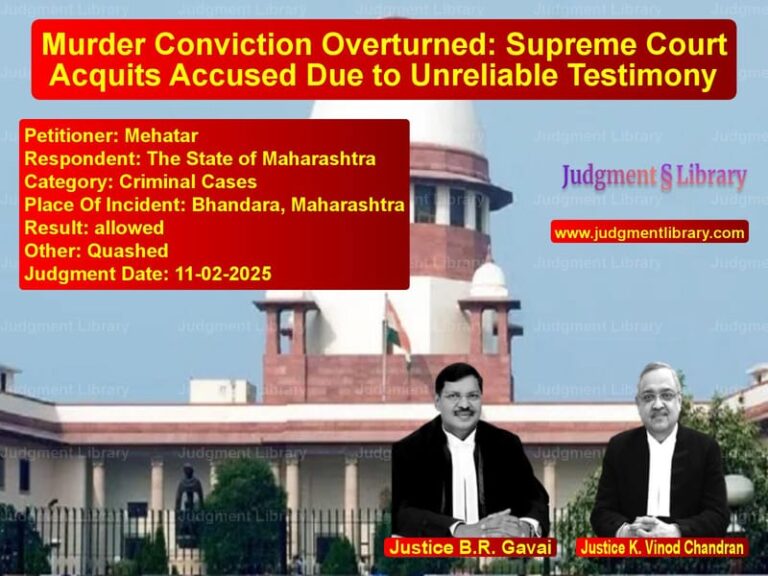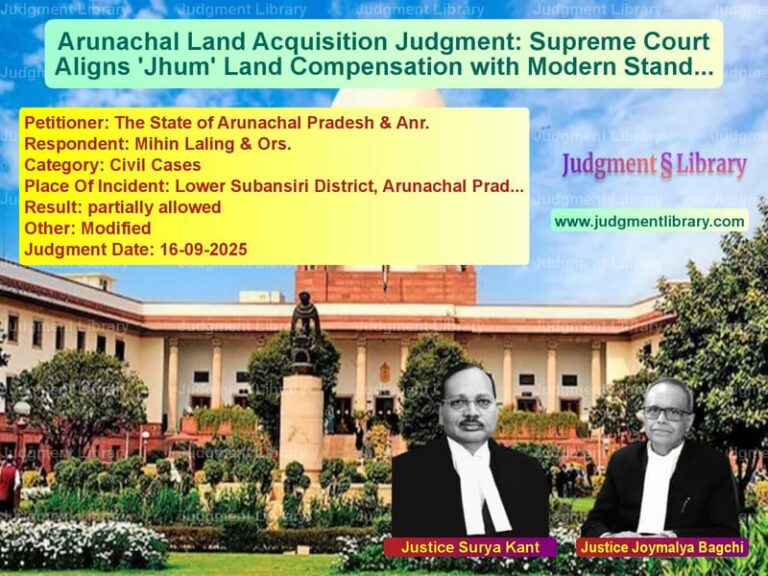Supreme Court Upholds Closure of Polluting Slaughterhouse in Rajasthan
The Supreme Court of India recently delivered a significant judgment in the case of Panchayat Qureshian & Another vs. State of Rajasthan & Others, concerning the closure of a slaughterhouse in Tonk, Rajasthan, due to severe pollution violations. The case originated from an application filed before the Permanent Lok Adalat, highlighting environmental hazards posed by the slaughterhouse’s operations.
Background of the Case
The matter began when Sarva Seva Sansthan, a social organization, filed an application before the Permanent Lok Adalat at Tonk, Rajasthan, alleging that a slaughterhouse operating near National Highway 12 was violating environmental regulations. The Lok Adalat ordered the closure of the slaughterhouse within a month and directed the Rajasthan Pollution Control Board and the District Collector to ensure compliance.
Pollution Control Measures and Legal Developments
Following the order, the Rajasthan Pollution Control Board (SPCB) issued closure directions under Section 33A of the Water (Prevention and Control of Pollution) Act, 1974, citing a lack of operational consent and non-compliance with Bio-Medical Waste (Management and Handling) Rules, 1988.
The slaughterhouse operators, represented by Panchayat Qureshian, challenged this order in the Rajasthan High Court through a writ petition under Article 226 of the Constitution. However, the High Court dismissed the petition on 15 October 2003, upholding the Lok Adalat’s directive.
Supreme Court Intervention
Seeking relief, Panchayat Qureshian approached the Supreme Court under Article 136 of the Constitution. Initially, the Supreme Court granted a stay on the High Court’s order on 21 November 2003. However, subsequent inspections revealed continued non-compliance with pollution norms.
The inspection reports indicated:
- No proper arrangements for waste disposal
- Untreated effluents discharged into nearby land
- Violation of permissible pollution limits under Schedule VI of the Environment (Protection) Rules, 1986
Closure Orders and Compliance
Due to persistent violations, the SPCB directed the municipal authorities to submit a feasibility report. The Commissioner of the Municipal Council applied for consent to operate the slaughterhouse under Sections 25/26 of the Water Act, but the SPCB rejected the application due to lack of compliance.
Further inspections in 2005 and 2007 revealed incomplete construction of an effluent treatment plant, leading to the discharge of untreated waste. Consequently, on 29 March 2008, the SPCB directed the Commissioner to shut down the slaughterhouse.
Final Verdict by the Supreme Court
The Supreme Court noted that the primary issue raised in the appeals—whether the Lok Adalat had jurisdiction to order the closure—had been rendered irrelevant by subsequent statutory actions taken by the SPCB.
Quoting the judgment:
“The closure of the slaughterhouse is not in pursuance of the direction of the Lok Adalat, but in exercise of the statutory jurisdiction of the Rajasthan Pollution Control Board.”
Recognizing that the closure was based on statutory environmental laws and due process, the Court dismissed the appeals and writ petitions, stating:
“The petitioners are not entitled to any relief since the closure of the slaughterhouse has been effected after following due process of law.”
Significance of the Judgment
The ruling reinforces the powers of pollution control authorities to regulate industries posing environmental hazards. It establishes that statutory bodies like the SPCB have the authority to enforce compliance with environmental laws and close operations that fail to adhere to prescribed standards.
Conclusion
This case sets a precedent for future environmental disputes by affirming the autonomy of statutory regulators over pollution control. The Supreme Court’s verdict ensures that businesses operating in violation of environmental laws cannot escape accountability by challenging procedural aspects. This judgment strengthens environmental governance in India and underscores the need for strict adherence to pollution control measures.
Petitioner Name: Panchayat Qureshian & Another.Respondent Name: State of Rajasthan & Others.Judgment By: Justice Dhananjaya Y Chandrachud, Justice Pamidighantam Sri Narasimha, Justice Manoj Misra.Place Of Incident: Tonk, Rajasthan.Judgment Date: 13-09-2023.
Don’t miss out on the full details! Download the complete judgment in PDF format below and gain valuable insights instantly!
Download Judgment: panchayat-qureshian-vs-state-of-rajasthan-&-supreme-court-of-india-judgment-dated-13-09-2023.pdf
Directly Download Judgment: Directly download this Judgment
See all petitions in Environmental Cases
See all petitions in Judgment by Dhananjaya Y Chandrachud
See all petitions in Judgment by P.S. Narasimha
See all petitions in Judgment by Manoj Misra
See all petitions in dismissed
See all petitions in supreme court of India judgments September 2023
See all petitions in 2023 judgments
See all posts in Environmental Cases Category
See all allowed petitions in Environmental Cases Category
See all Dismissed petitions in Environmental Cases Category
See all partially allowed petitions in Environmental Cases Category

